- Serbia
Get to know Serbia
- Citizens
Culture and science
Health services
Pension and disability insurance
- Business
Employment
Economy
- Media
- Government
- Contact
Keep in touch
Contact form
Back
Keepin touch
Whether you have a question, comment, suggestion or any problem in the purview of the government, send us your message and we will try to respond as soon as possible. If your problem is not in our purview, we will forward your message to the relevant institution.
Q:
A:
Intercultural dialogue important for sustainable development in Europe
Belgrade/Baku,
2 December 2008
Serbian Minister of Culture Nebojsa Bradic today said at the ministerial conference on intercultural dialogue in Baku that it is impossible to talk about the cultural identity of any single country in the region without taking into account the identity of the region as a whole and the influence of various cultures and civilizations.
Speaking at the conference Bradic said, today we are talking about advancing the intercultural dialogue not just from the perspective of our official duties, but also as a way of contributing to the peace and sustainable development of Europe and its regional neighbours.
He pointed to the fact that we are witness to enormous political and economic changes all over the world, saying that one of Serbia’s priorities during its Council of Europe presidency last year was building a more humane Europe.
He said that Serbia stressed the importance of protecting, promoting and preserving cultural diversity as a factor in human development and freedom.
In accordance with this, during the 2008 intercultural dialogue, the Serbian government developed a special programme, emphasizing the importance of the work done jointly with the working group for preserving cultural diversity and intercultural dialogue, said Bradic.
He said that Serbia is not a big country and the Serbian language and culture are just one part of European and world culture. Bradic stressed that Serbia is proud of its many different national minority councils.
He said that these various ethnic groups are of Hungarian, Romanian, Slovak, Russian, Romani, Bosniak, Ukrainian, Croatian, Bulgarian, Macedonian, Egyptian, Greek, German and Vlax origin.
In cooperation with them the Ministry of Culture has worked on preventing the isolation of national minorities by encouraging dialogue and creative projects, said Bradic.
He said that all such activities are planned according to the Faro Platform, the White Book on intercultural dialogue of the Council of Europe, stressing that the Baku declaration will be of great importance for the development of regional cooperation and intercultural dialogue.
The two day conference of ministers responsible for culture dedicated to intercultural dialogue as a basis for peace and sustainable development in Europe that opened today is an opportunity to examine at ministerial level the continuation of the process of intercultural dialogue following the publication of the Council of Europe’s “White Book” on intercultural dialogue.
Bradic also met with ministers of culture for Poland, Turkey, Egypt and Macedonia.
He pointed to the fact that we are witness to enormous political and economic changes all over the world, saying that one of Serbia’s priorities during its Council of Europe presidency last year was building a more humane Europe.
He said that Serbia stressed the importance of protecting, promoting and preserving cultural diversity as a factor in human development and freedom.
In accordance with this, during the 2008 intercultural dialogue, the Serbian government developed a special programme, emphasizing the importance of the work done jointly with the working group for preserving cultural diversity and intercultural dialogue, said Bradic.
He said that Serbia is not a big country and the Serbian language and culture are just one part of European and world culture. Bradic stressed that Serbia is proud of its many different national minority councils.
He said that these various ethnic groups are of Hungarian, Romanian, Slovak, Russian, Romani, Bosniak, Ukrainian, Croatian, Bulgarian, Macedonian, Egyptian, Greek, German and Vlax origin.
In cooperation with them the Ministry of Culture has worked on preventing the isolation of national minorities by encouraging dialogue and creative projects, said Bradic.
He said that all such activities are planned according to the Faro Platform, the White Book on intercultural dialogue of the Council of Europe, stressing that the Baku declaration will be of great importance for the development of regional cooperation and intercultural dialogue.
The two day conference of ministers responsible for culture dedicated to intercultural dialogue as a basis for peace and sustainable development in Europe that opened today is an opportunity to examine at ministerial level the continuation of the process of intercultural dialogue following the publication of the Council of Europe’s “White Book” on intercultural dialogue.
Bradic also met with ministers of culture for Poland, Turkey, Egypt and Macedonia.
-
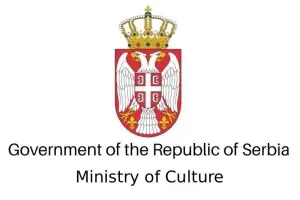 Belgrade, 10 November 2025
Belgrade, 10 November 2025Initiative to ban photo exhibition “Serbian Woman” attack on historic memory
-
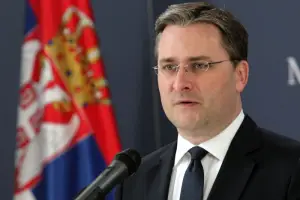 Belgrade, 8 November 2025
Belgrade, 8 November 2025Croatia obliged to respond adequately to emergence of hatred, extremism against Serbs
-
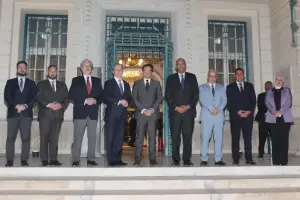 Belgrade/Cairo, 3 November 2025
Belgrade/Cairo, 3 November 2025Culture as foundation for enhancing overall relations between Serbia, Egypt
-
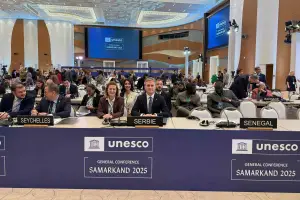 Belgrade/Samarkand, 31 October 2025
Belgrade/Samarkand, 31 October 2025Serbia’s continued commitment to preservation of cultural heritage
-
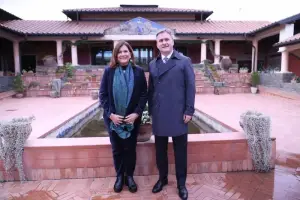 Požarevac, 24 October 2025
Požarevac, 24 October 2025Strengthening cooperation with Cyprus in field of cultural heritage protection
-
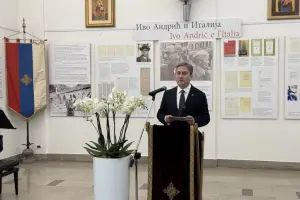 Belgrade/Trieste, 18 October 2025
Belgrade/Trieste, 18 October 2025Exhibition on Ivo Andrić in Trieste new bridge of cultural cooperation with Italy
-
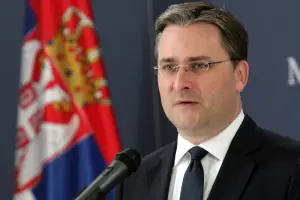 Belgrade, 7 October 2025
Belgrade, 7 October 2025Condemnation of marking Serbian cultural heritage as Albanian
-
 Belgrade/Osaka, 5 October 2025
Belgrade/Osaka, 5 October 2025Virtual promotion of Serbian tradition, culture in Osaka
-
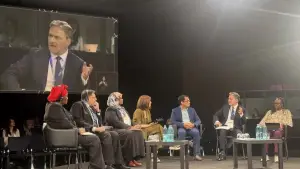 Belgrade/Barcelona, 1 October 2025
Belgrade/Barcelona, 1 October 2025Cultural heritage as foundation of preserving national identity
-
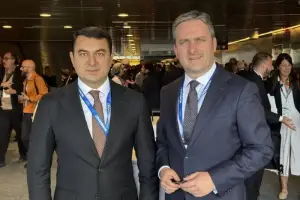 Belgrade/Barcelona, 29 September 2025
Belgrade/Barcelona, 29 September 2025Cultural cooperation between Serbia, Azerbaijan to further strengthen overall relations
